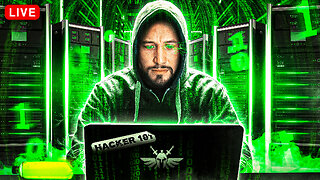Premium Only Content

France Takes Algeria, Algeria (Islam) Takes France? Andrew Hussey on The French Intifada
Professor Andrew Hussey, a distinguished academic and author whose extensive work explores the intricate and often fraught relationship between France and its former colonies. Hussey's deep dive into the historical and contemporary issues that define this relationship is encapsulated in his critically acclaimed book, "The French Intifada." His latest project, "France in Fragments," continues this exploration, shedding light on the fractures within French society and the challenges it faces today.
Hussey's journey began in 1984 when he arrived in Lyon to study, an experience that opened his eyes to the unique forms of violence and insurrection emerging from the city’s North African communities. This personal journey, combined with his academic rigor, provides a powerful lens through which he examines France's colonial legacy and its enduring impact on identity and social cohesion. "The French government didn't understand the violence in Lyon, calling it 'urban riots,' which showed how much they really didn't understand what was going on," he reflects.
A central theme in Hussey's work is the complex family-like relationship between France and Algeria. "France's relationship with Algeria is a complex family relationship, not just a straightforward colonizer and colonized dynamic," he notes. This complexity is vividly illustrated in the term "French Intifada," which he acknowledges as controversial but accurate in describing the ongoing tensions.
Hussey's research on cities like Marseille reveals how these urban areas serve as microcosms for broader societal issues. "Marseille's transformation into a narco-city is a story of immigration, urbanism, and organized crime, but not Islam," he explains, highlighting the multifaceted nature of urban dynamics in France. This is further complicated by the exportation of the Algerian war of the 1990s to France, manifesting in acts of terrorism and violence that have left indelible marks on French society.
The rise of anti-Semitism is another critical issue Hussey addresses, noting, "The term 'yid,' a word belonging to the 1930s, has been resurrected in the 2020s, indicating a new form of anti-Semitism in France." This resurgence of old prejudices reflects deeper societal tensions that are exacerbated by immigration and the challenges of integration.
Hussey also critiques the French left's stance on cultural symbols, particularly the veil. "There's a contradiction in the French left's support for the veil in schools, which undermines the principles of laïcité," he argues, pointing out the inconsistencies in political discourse surrounding secularism and religious expression.
At the heart of Hussey's work is the civilizational question facing France: "Whether it can absorb and assimilate a population that finds itself at odds with European enlightenment values." This question underscores the broader challenges of integration and multiculturalism in contemporary France, making Hussey's insights both timely and crucial for understanding the nation's current and future trajectory.
In summary, Professor Andrew Hussey's profound and provocative work offers invaluable perspectives on France's colonial legacy, its impact on identity, and the pressing issues of violence, radicalization, and anti-Semitism. His nuanced analysis and firsthand experiences provide a compelling narrative that is essential for anyone seeking to understand the complexities of modern French society.
-
 LIVE
LIVE
SpartakusLIVE
32 minutes ago#1 Hacker/Scammer PLUNGES into CRYPTO || !crypto !spartacoin
160 watching -
 53:15
53:15
Kimberly Guilfoyle
3 hours agoCalifornia Residents Demand Answers, Live with Rep Vince Fong, Mike Davis, and Paul Peterson | Ep. 188
20.5K36 -
 1:49:51
1:49:51
Redacted News
3 hours agoEMERGENCY! 10 MILLION UNDER FIRE WARNING & 100 MPH WINDS, NEWSOM UNVEILS CALIFORNIA 2.0 PLAN
71.3K95 -
 49:33
49:33
Candace Show Podcast
2 hours agoI Respond To Mr. And Mr. Macron | Candace Ep 131
48.6K118 -
 1:58:04
1:58:04
Revenge of the Cis
4 hours agoEpisode 1429: Catch And Release
15.4K1 -
 2:00:01
2:00:01
Film Threat
8 hours agoVERSUS: HOLLYWOOD IS STILL ON FIRE | Film Threat Versus
7.26K -
 12:33
12:33
Silver Dragons
3 hours agoSilver Price Crushed Today - NEW TREND STARTING?
7.47K -
 1:02:03
1:02:03
In The Litter Box w/ Jewels & Catturd
21 hours agoRecall Newscum & Bass! | In the Litter Box w/ Jewels & Catturd – Ep. 718 – 1/13/2025
64.3K28 -
 3:19:58
3:19:58
Tate Speech by Andrew Tate
10 hours agoEMERGENCY MEETING EPISODE 101 - STRENGTH AND HONOR
156K66 -
 1:48:09
1:48:09
The Quartering
6 hours agoLA Fires Are About To Get Way Worse, Trump Vs Vance On J6 Pardons, Brett Cooper Bombshell & More
98.6K43